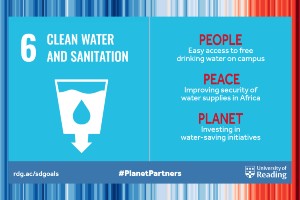#PlanetPartners: Improving access to water globally, while reducing consumption on campus
12 May 2021

Helping African communities manage demand for valuable water sources and significantly reducing water consumption on campuses are examples of how the University of Reading is helping ensure everyone can access this fundamental commodity.
The University’s institutional and research efforts are underpinned by the UN’s 17 Sustainable Development Goals (SDGs), which are aimed at tackling societal and environmental challenges across the planet and are closely aligned with the University’s own strategy.
This May, the University of Reading is running a new #PlanetPartners campaign, inviting its entire community to share examples of work towards all the SDGs.
SDG6: Clean Water and Sanitation encompasses efforts to make clean water is available to everyone, and that resources and sanitation are managed in a sustainable way.
“We found that, if managed well at local and national level, groundwater has the potential to counteract the increased variability of rainfall and availability of surface water in parts of Africa in the coming years." - Dr Luisa Ciampi, Walker Institute
Examples of work by the University to address SDG6 include:
- Reducing water consumption on campus, including a reduction of around 27% across all campuses, excluding halls of residence, between 2011/12 and 2019/20, which meant Reading had the third lowest water consumption per head of any research-intensive university. A £2,398 spent on water-saving initiatives in 2018/19 included new tap controls in showers at the Sports Park targeted to save 2,500 cubic metres of water per year.
- Publishing a Carbon and Water Management Plan.
- Improving the security of water supplies in Africa, through projects such as the Walker Institute-led BRAVE ground water project. BRAVE is part of the UPGRO consortia and uses state-of-the-art climate, land surface and groundwater models to improve understanding of how underground aquifers in sub-Saharan Africa should be managed to combat water availability challenges due to climate change. Water access is a contributing factor to much conflict across the continent.
- Running multiple projects assessing glacier melts and changes in water availability in the water-deficient region of Central Asia, which strongly depends glacier runoff for water provision. The University leads an extensive programme on impacts of glacier retreat on water quality downstream in four countries – Kazakhstan, Kyrgyzstan, Tajikistan and Uzbekistan – with the help of the Central Asia Research and Adaptation Network (CARAWAN). Similar work is now beginning in the Caucasus, Russia.
- Working with local partners in Peru, to determine suitable adaptation strategies to cope with the climate-change impacts on the water resources of rural communities living in the Andes. This includes investigating crop irrigation demand at multiple locations in the Peruvian Andes and projecting changes in future water availability to help communities make plans.
- Providing free drinking water to students and staff, with more than 30 taps/water fountains/coolers on Whiteknights and London Road campuses.
- Working with communities through Water@Reading to monitor water quality and climate impacts on water resources.
- Collaborating with partners to monitor groundwater on University land near the River Loddon.
Dr Luisa Ciampi, a researcher at the Walker Institute at the University of Reading, said: “Over the coming years, climate change is predicted to cause more erratic rainfall which will affect the availability of surface water such as rivers and dams, and have a major impact on communities who rely on agriculture due to water shortages.
“The BRAVE project examined how communities in northern Ghana and Burkina Faso are currently using water found underground, which is less affected by rainfall variability, and how the sustainable use and management of this groundwater could improve community resilience to climate change.
“We found that, if managed well at local and national level, groundwater has the potential to counteract the increased variability of rainfall and availability of surface water in parts of Africa in the coming years, which could otherwise leave communities severely short of water for domestic and productive use.
“Communities will only have the potential to properly utilise this valuable resource if they are supported by policy shifts and capacity building exercises, and bringing about these changes is one of the objectives of our work.”
The UN’s SDGs incorporate themes across the ‘five Ps’: People, Prosperity, Planet, Peace and Partnership. These align with the University of Reading’s own strategic themes: Community, Excellence, Sustainability and Engagement.
This campaign follows the publication of the Times Higher Education Impact Rankings 2021, in which Reading participated for the first time and ranked in the top 200 globally, which scored participating universities on their support of the individual SDGs.
#PlanetPartners
The University’s latest campaign is a continuation of the #PlanetPartners campaign launched by the University in October 2019, which is highlighting ways the University is working with global partners on projects that benefit the environment.
Follow the campaign and share your examples of work on Twitter: @UniofReading | Facebook: /theuniversityofreading | Instagram: @uniofreading | LinkedIn: University of Reading | TikTok: @uniofreading using the hashtags #PlanetPartners and #sdgoals

